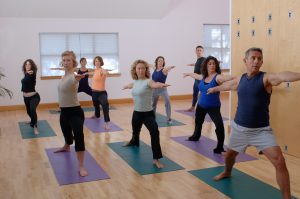 Stretching and breathing your way through yoga poses is good for the body and spirit. I’ve tried it myself – getting into “corpse” pose at the end is like floating on cloud nine!
Stretching and breathing your way through yoga poses is good for the body and spirit. I’ve tried it myself – getting into “corpse” pose at the end is like floating on cloud nine!
This ancient practice has taken off in North America in various forms, like gentle yoga for seniors, yoga bootcamp and even laughter yoga that taps into the healing power of laughter. Yoga is such a positive way to improve your physical and mental health.
Advertisement
But unfortunately, according to recent findings, this peaceful form of exercise is not much help to people with asthma.
A new study published in the June edition of Annals of Allergy, Asthma & Immunology, found the health benefits that many love about yoga are absent if you suffer from asthma.
The study looked at 14 previously published studies involving 824 adults from North America, Europe, Asia, Africa and Australia to gauge the effectiveness of yoga in asthma treatment. More specifically, researchers wanted to find evidence that yoga actually improves their lung function and quality of life. Because only a single trial included children, however, the effects of yoga on that group couldn’t be evaluated.
As study author Holger Cramer told Science Daily, “Many people practice yoga for its health benefits, including asthma sufferers.”
However, “We reviewed the available data to see if it made a difference and found only weak evidence that it does. Yoga can’t be considered a routine intervention for patients with asthma at this time. But it can be considered an alternative to breathing exercises for asthma patients interested in complementary interventions.”
In other words, don’t expect the rhythmic deeper breathing that comes with yoga to cure your asthma or guarantee you’ll breathe easier outside the yoga studio. Scientific research says it might help as an alternative to other breathing exercises, but don’t abandon your regular treatment or puffer prescribed by your doctor.
RELATED READING: If your breathing problems are getting worse…
Asthma is a long-term disease that has no cure
Asthma has no cure. Instead, it has only controls that prevent chronic and troublesome symptoms, such as coughing and shortness of breath that can lead to emergency room visits or hospital stays. There is treatment for some of the symptoms, such as helping lungs function better and aiding in sleep quality.
Controlling asthma by treating the symptoms
Prevention is always the best way to control asthma symptoms. Parents of children with asthma should take a more active role in their care as the condition can become dangerous and even potentially deadly. People need to work with their doctor and an allergist to determine what prompts asthma attacks and avoid these situations whenever possible.
Asthma triggers include exposure to allergens, respiratory infections and even the cold weather. If asthma attacks are severe enough, if they are happening more than twice a week, then treatment with a long-term control medication is advised.
As we know, long-term medications are preventive. They’re taken every day and can help asthma sufferers control most asthma symptoms. For people with what’s called allergic asthma, immunotherapy, or allergy shots, medication may alleviate symptoms brought on by allergens that simply can’t be avoided.
Advertisement
RELATED READING: Best fix for allergies this season
So while researchers can’t exactly recommend yoga to asthma sufferers as a treatment, that doesn’t diminish the calming, strength-building benefits you can get from it. I’m all for it, just work at your own pace and start slow if you’re a beginner.
Yoga is relaxing and may help you to breathe a little easier, so why not try striking a pose right now?
